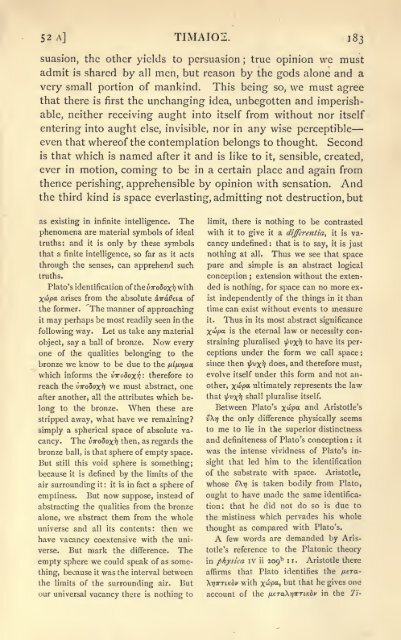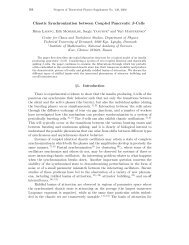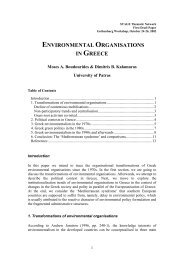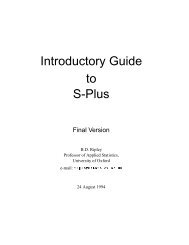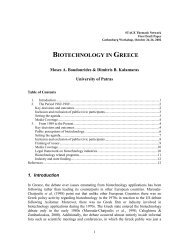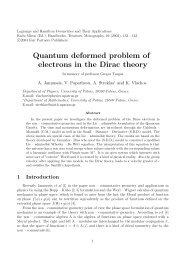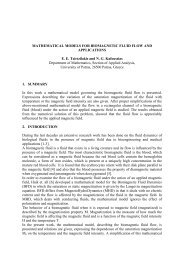You also want an ePaper? Increase the reach of your titles
YUMPU automatically turns print PDFs into web optimized ePapers that Google loves.
52 A] TIMAI02. 183<br />
suasion, the other yields to persuasion true ; opinion we must<br />
admit is shared by all men, but reason by the gods alone and a<br />
very small portion <strong>of</strong> mankind. This being so, we must agree<br />
that there is first the unchanging idea, unbegotten and imperishable,<br />
neither receiving aught into<br />
itself from without nor itself<br />
entering into aught else, invisible, nor in any wise perceptible<br />
even that where<strong>of</strong> the contemplation belongs to thought. Second<br />
is that which is named after it and is like to it, sensible, created,<br />
ever in motion, coming to be in a certain place and again from<br />
thence perishing, apprehensible by opinion with sensation. And<br />
the third kind is<br />
space everlasting, admitting not destruction, but<br />
limit, there is as existing in infinite intelligence. <strong>The</strong><br />
nothing to be contrasted<br />
our universal vacancy there is nothing to account <strong>of</strong> the /teTaXrprriKii' in the 7'i-<br />
phenomena are material symbols <strong>of</strong> ideal with it to give it a differentia, it is vacancy<br />
truths: and it is only by these symbols<br />
undefined : that is to say, it is just<br />
that a finite intelligence, so far as it acts nothing at all. Thus we see that space<br />
through the senses, can apprehend such pure and simple is an abstract logical<br />
truths.<br />
conception ; extension without the extended<br />
<strong>Plato</strong>'s identification <strong>of</strong> iheviroSoxy with<br />
Xwpa arises from the absolute &Tra0eia <strong>of</strong> is nothing, for space can no more ex-<br />
ist independently <strong>of</strong> the things in it than<br />
the former. <strong>The</strong> manner <strong>of</strong> approaching time can exist without events to measure<br />
it<br />
may perhaps be most readily seen in the it. Thus in its most abstract significance<br />
following way. Let us take any material X^P a is the eternal law or necessity constraining<br />
object, say a ball <strong>of</strong> bronze. Now every<br />
pluralised fox^ to have its per-<br />
one <strong>of</strong> the qualities belonging to the ceptions under the form we call space :<br />
bronze we know to be due to the nlfnjua. since then foxy does, and therefore must,<br />
which informs the viroSox'f;' therefore to evolve itself under this form and not another,<br />
reach the uTroSox^j we must abstract, one<br />
after another, all the attributes which belong<br />
x^P a ultimately represents the law<br />
that fox^l shall pluralise itself.<br />
to the bronze. When these are Between <strong>Plato</strong>'s x^Pa and Aristotle's<br />
stripped away, what have we remaining? v\rj the only difference physically seems<br />
simply a spherical space <strong>of</strong> absolute vacancy.<br />
to me to lie in the superior distinctness<br />
<strong>The</strong> viroSoxT] then, as regards the and definiteness <strong>of</strong> <strong>Plato</strong>'s conception : it<br />
bronze ball, is that sphere <strong>of</strong> empty space.<br />
was the intense vividness <strong>of</strong> <strong>Plato</strong>'s insight<br />
But still this void sphere is<br />
something;<br />
that led him to the identification<br />
because it is defined by the limits <strong>of</strong> the <strong>of</strong> the substrate with space. Aristotle,<br />
air surrounding it : it is in fact a sphere <strong>of</strong> whose V\TI is taken bodily from <strong>Plato</strong>,<br />
emptiness. But now suppose, instead <strong>of</strong> ought to have made the same identification:<br />
abstracting the qualities from the bronze<br />
that he did not do so is due to<br />
alone, we abstract them from the whole the mistiness which pervades his whole<br />
universe and all its contents: then we thought as compared with <strong>Plato</strong>'s.<br />
have vacancy coextensive with the universe.<br />
A few words are demanded by Aris-<br />
But mark the difference. <strong>The</strong> totle's reference to the <strong>Plato</strong>nic theory<br />
empty sphere we could speak <strong>of</strong> as something,<br />
in physica IV b n. ii 29<br />
Aristotle there<br />
because it was the interval between affirms that <strong>Plato</strong> identifies the /tera-<br />
in the limits <strong>of</strong> the surrounding air. But XtjvTiKiiv with x^pa, but that he gives one


